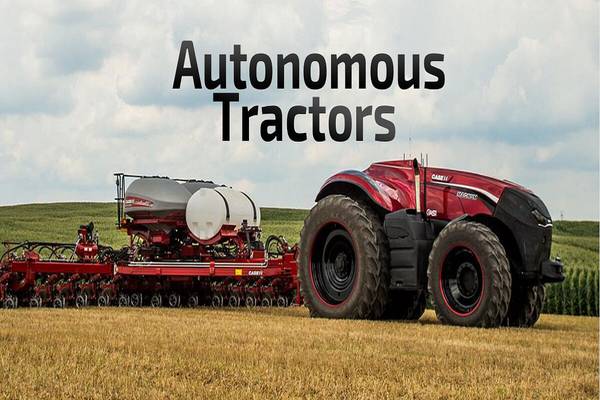Smart And Autonomous Agricultural Machinery
Drafted by: vijaychourey26@gmail.com
In recent years, the agricultural industry has undergone a remarkable transformation with the advent of autonomous agricultural machinery. This groundbreaking technology has revolutionized traditional farming practices, offering unprecedented efficiency, precision, and sustainability. In this article, we will delve into the world of autonomous agricultural machinery, exploring its benefits, applications, and potential challenges.
The emergence of autonomous agricultural machinery represents a paradigm shift in the way we cultivate crops and manage farmlands. These advanced machines incorporate cutting-edge technologies, such as artificial intelligence (AI), global positioning systems (GPS), and sensors, to perform a wide range of farming tasks autonomously, minimizing human intervention.
The Rise Of Autonomous Agriculture
The concept of autonomous machinery in agriculture is not a new one; however, recent advancements in AI and robotics have propelled it to new heights. Farmers are now able to delegate time-consuming and labor-intensive activities to machines, allowing them to focus on higher-level decision-making.
Advantages Of Autonomous Agricultural Machinery
Increased Efficiency and Productivity
One of the primary benefits of autonomous agricultural machinery is its ability to significantly enhance farm efficiency and productivity. These machines can operate around the clock without the need for breaks, leading to faster and more streamlined operations.
Precision Farming Techniques
Autonomous machinery enables precision farming techniques that were previously unimaginable. Through precise data collection and analysis, farmers can optimize seed planting, fertilization, and irrigation, resulting in higher yields and resource savings.
Reduced Environmental Impact
With the integration of autonomous machinery, agricultural practices can become more environmentally friendly. By utilizing data-driven insights, farmers can minimize resource wastage and chemical usage, contributing to sustainable and eco-conscious farming.
Types Of Autonomous Agricultural Machinery
Autonomous Tractors
Autonomous tractors are the workhorses of modern autonomous agriculture. Equipped with advanced navigation systems, these tractors can plow, plant, and harvest crops with unparalleled accuracy.
Harvesting Robots
Harvesting robots have transformed the way we gather crops. These robots are capable of identifying ripe produce, delicately picking them, and even sorting them based on quality.
Crop Monitoring Drones
Crop monitoring drones provide farmers with real-time aerial views of their fields. This technology aids in early pest detection, disease management, and crop health assessment.
How Autonomous Machinery Works
Autonomous agricultural machinery relies on a combination of technologies to operate seamlessly. GPS systems ensure precise navigation, while sensors collect data on soil conditions, plant health, and more.
Challenges and Considerations:
Initial Costs and Implementation
While the benefits are evident, the initial investment in autonomous machinery can be substantial. The cost of purchasing and implementing these advanced systems may be a barrier for some farmers.
Technological Dependence
As farms become increasingly reliant on technology, concerns arise regarding system malfunctions and the ability to maintain traditional farming practices if the technology were to fail.
Data Privacy and Security
The collection and utilization of vast amounts of agricultural data raise concerns about data privacy and security. Farmers must ensure that their sensitive information remains protected.
Future Trends And Innovations
The future of autonomous agricultural machinery holds exciting possibilities. Continued advancements in AI and robotics are expected to lead to even more sophisticated and capable machines.
Impact on Rural Employment:
The adoption of autonomous machinery has sparked discussions about its impact on rural employment. While some fear job displacement, others argue that these technologies can create new opportunities in specialized fields.
Autonomous Machinery In Sustainable Agriculture
Water and Resource Management
Autonomous machinery can play a pivotal role in water and resource management. Through precise monitoring, farmers can optimize water usage and reduce waste.
Pest Control and Precision Spraying
By utilizing data from sensors and drones, farmers can target specific areas for pest control measures, reducing the need for widespread chemical application.
Real-Life Success Stories
Case Study: The Autonomous Vineyard
A vineyard in California successfully implemented autonomous machinery for pruning, harvesting, and maintenance. This resulted in higher grape quality and production efficiency.
Enhancing Livestock Management
Autonomous technology extends beyond crops. Some farms are using robotic systems for tasks like feeding and monitoring livestock, leading to healthier animals and more effective management.
Overcoming Skepticism And Adoption Barriers
Addressing Farmer Concerns
To encourage widespread adoption, manufacturers and policymakers need to address farmers' concerns about the technology's reliability, maintenance, and long-term benefits.
Government Regulations and Policies
Clear and supportive regulations are essential for the smooth integration of autonomous machinery into the agricultural landscape.








